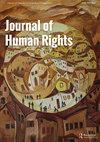On conceptions of time in human rights studies: The afterlife, Islam, and reparative justice in post-uprising Tunisia
IF 1.6
2区 社会学
Q3 INTERNATIONAL RELATIONS
引用次数: 1
Abstract
Abstract This article argues that conceptions of time are undertheorized in human rights studies and that such conceptions have a significant impact on how people participate in systems of justice. Within the context of the transitional justice process launched in Tunisia in the aftermath of the 2011 Arab Spring—a context deeply shaped by an Islamist/secular divide—I examine how competing notions of time led to opposing modes of participation in reparative justice. Specifically, I analyze the Islamic principle thawāb (reward in the afterlife for suffering experienced on earth) as a theological notion of time and show how it structured Islamist victims’ participation in reparations measures. Observing that critiques of reparative justice have developed through a strictly secular notion of time, this article foregrounds Islamic concepts that are still underrepresented in such studies, particularly Islamic notions of time and the afterlife. I argue that thawāb contests the universalism of the secular, linear notion of past-present-future dominant in human rights and transitional justice studies.人权研究中的时间概念:突尼斯起义后的来世、伊斯兰教和补偿性正义
摘要本文认为,在人权研究中,时间概念被低估了,这种概念对人们如何参与司法系统有着重大影响。在2011年阿拉伯之春后突尼斯启动的过渡司法进程的背景下——这一背景深受伊斯兰/世俗分歧的影响——我研究了相互竞争的时间观念是如何导致参与补救性司法的对立模式的。具体而言,我将伊斯兰原则“解冻”(对在地球上经历的痛苦的死后奖励)作为一种神学的时间概念进行了分析,并展示了它是如何构建伊斯兰受害者参与赔偿措施的。鉴于对修复性正义的批评是通过一种严格的世俗时间观发展起来的,本文强调了在此类研究中仍然代表性不足的伊斯兰概念,特别是伊斯兰的时间和来生概念。我认为,thawāb与人权和过渡司法研究中占主导地位的世俗、线性的过去-现在-未来概念的普世主义相抗衡。
本文章由计算机程序翻译,如有差异,请以英文原文为准。
求助全文
约1分钟内获得全文
求助全文

 求助内容:
求助内容: 应助结果提醒方式:
应助结果提醒方式:


